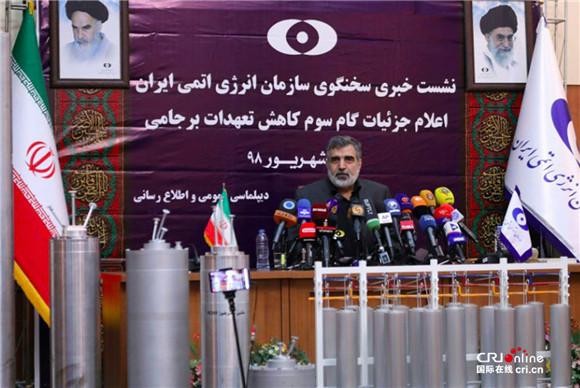Iran activates advanced centrifuges to boost uranium enrichment capacity
 0 Comment(s)
0 Comment(s) Print
Print E-mail Xinhua, September 8, 2019
E-mail Xinhua, September 8, 2019
Iran on Saturday announced the details of a fresh move to stray away from its commitments pertaining to the landmark 2015 multilateral nuclear accord, technically known as Joint Comprehensive Plan of Action (JCPOA).

According to the announcement, Iran has activated 20 IR-4 centrifuges and 20 IR-6 centrifuges to boost the country's stockpile of enriched uranium.
The spokesman for the Atomic Energy Organization of Iran (AEOI), Behrouz Kamalvandi, said Saturday that the capacity of these machines is "many times" more than the previous machines.
"We have started lifting limitations on our research and development (R&D) program imposed by the deal ... It will include development of more rapid and advanced centrifuges," Kamalvandi said.
Iran's new move to drop limitations on its R&D will facilitate the enrichment of uranium up to a level of 1,000,000 separative work units (SWUs), he said.
SWU is the standard measure of the effort required to separate isotopes of uranium during an enrichment process. One SWU is equivalent to one kg of separative work.
The International Atomic Energy Agency (IAEA) has been informed about Iran's new nuclear steps, Kamalvandi said, adding that the IAEA will continue to monitor Iran's nuclear activities.
On Thursday, Iranian President Hassan Rouhani said that the Islamic Republic will expand its nuclear research and development to set aside the restrictions imposed on the country's research and development activities in the nuclear deal.
Despite progress in the negotiations between Iran and the European parties to the nuclear deal, "final agreement has not been reached so far" pertaining to Iran's interests under the deal, Rouhani said.
Rouhani also noted that he would give Europeans two months to fulfill their commitments to shield the Iranian economy from the U.S. sanctions.
Under the accord, Iran was allowed to keep restricted quantities of first-generation centrifuges, no more than 5,060 IR-1 centrifuges, at its two nuclear plants until 2026.
Since May, Iran has already broken away with the restrictions set by the nuclear accord on the stockpile of its low-grade enriched uranium and its concentration in a reaction to the U.S. exit from the international deal last year.
Kamalvandi said that the cuts of commitments are reversible if other parties to the JCPOA fulfill their obligations.
On Saturday, the IAEA said that it has inspectors on the ground in Iran who will be able to look into Tehran's move to start advanced centrifuges to increase the country's uranium stockpiles, according to Press TV.
The UN nuclear watchdog said that it is aware of the reports "related to Iran's centrifuge research and development" and that its "inspectors are on the ground in Iran and they will report relevant activities to IAEA headquarters."
An IAEA spokesman said on Friday that the acting chief of the agency, Cornel Feruta, plans to visit Iran to hold talks with high-level Iranian officials in Tehran on Sunday.
"The visit is part of ongoing interactions between the IAEA and Iran," the agency's spokesman said.
Feruta's visit to Tehran comes before a quarterly meeting of the IAEA's Board of Governors in Vienna next Monday.






Go to Forum >>0 Comment(s)